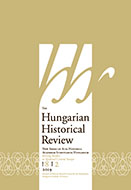Notevole larghezza, notizie così gravi e gelose and un uomo che amava spacciarsi: Human Resources of Diplomatic Exchange of King Alfonso V of Aragon in the Balkans (1442–1458)
Notevole larghezza, notizie così gravi e gelose and un uomo che amava spacciarsi: Human Resources of Diplomatic Exchange of King Alfonso V of Aragon in the Balkans (1442–1458)
Author(s): Nada ZečevićSubject(s): 15th Century
Published by: Magyar Tudományos Akadémia Bölcsészettudományi Kutatóközpont Történettudományi Intézet
Keywords: Alfonso V of Aragon; Aragon Naples; diplomacy; Medieval Balkans; feudal lords in the medieval Balkans; prosopography
Summary/Abstract: During his reign in Naples, between 1442 and 1458, King Alfonso V of Aragon exchanged a series of diplomatic communications with the Christian East, namely with Byzantine Emperors John VIII (1425–1448) and Constantine XI Dragases (1449–1453) and their close kin, but also with the most prominent feudal lords of the Balkan peninsula (Herzeg Stjepan Vukčić Kosača, George Castrioti Skanderbey, etc.). The basic historical details of these missions are largely known to modern scholarship, which usually regards them as part of the king’s attempt to secure individual allies in his planned anti-Ottoman crusade and expansion towards the imperial throne in Constantinople. Scholarship, however, is limited on the details of these relations, partly due to the fragmentary nature of the sources and partly because of the missions’ secret character. In this paper, I am attempting to learn more about King Alfonso’s attention to the Balkans by observing the human resources which sustained not just his missions, but also other forms of the kingdom’s exchange across the Adriatic. The inquiry, which is based on the study of the available prosopographic data concerning individuals who appear to have been prominent in this, indicates that the basic circle which sustained this process consisted of Catalan bankers and highly ranked notaries, all resident in Naples since Alfonso’s access to the throne of the kingdom in 1442, but this circle also received several local commoners loyal to the king, with Simone Caccetta as their leading figure. His networks show that the king’s diplomatic exchange with the Balkans was largely characterized by a specific form of corruption, by which the bankers who invested their money in the king’s diplomatic activities in the Balkans received lucrative positions in the royal customs and local administration of Puglia, which they further used to enhance their access to the kingdom’s economic exchange with the Balkans and, consequently, to augment their wealth. This process was heavily scrutinized by Simone Caccetta, who involved in it an entire circle of small traders and soldiers directly loyal to him, thus affirming their positions but also his own position in the Aragon service and Aragon courtly society.
Journal: The Hungarian historical review : new series of Acta Historica Academiae Scientiarum Hungaricae
- Issue Year: 8/2019
- Issue No: 2
- Page Range: 411-433
- Page Count: 23
- Language: English

